Economic and Financial Management: EDF Energy Company Case Study
VerifiedAdded on 2023/06/14
|8
|1970
|303
Report
AI Summary
This report examines the economic and financial management of EDF Energy, a British company, focusing on the impacts of the COVID-19 pandemic. It analyzes the energy industry before and after the pandemic, detailing the shifts in energy demand, technological changes, and supply chain disruptions. The report explores micro and macro factors affecting EDF Energy using SWOT and PESTEL analyses, covering aspects like market position, political and economic influences, social values, technological advancements, environmental concerns, and legal compliance. Additionally, it applies Neo-Classical and Keynesian economic theories to understand consumption patterns and government policy impacts on the energy sector. The conclusion summarizes the significant influence of COVID-19 on EDF Energy's operations and highlights the importance of micro and macro analysis and economic theories in understanding the company's position and strategies.
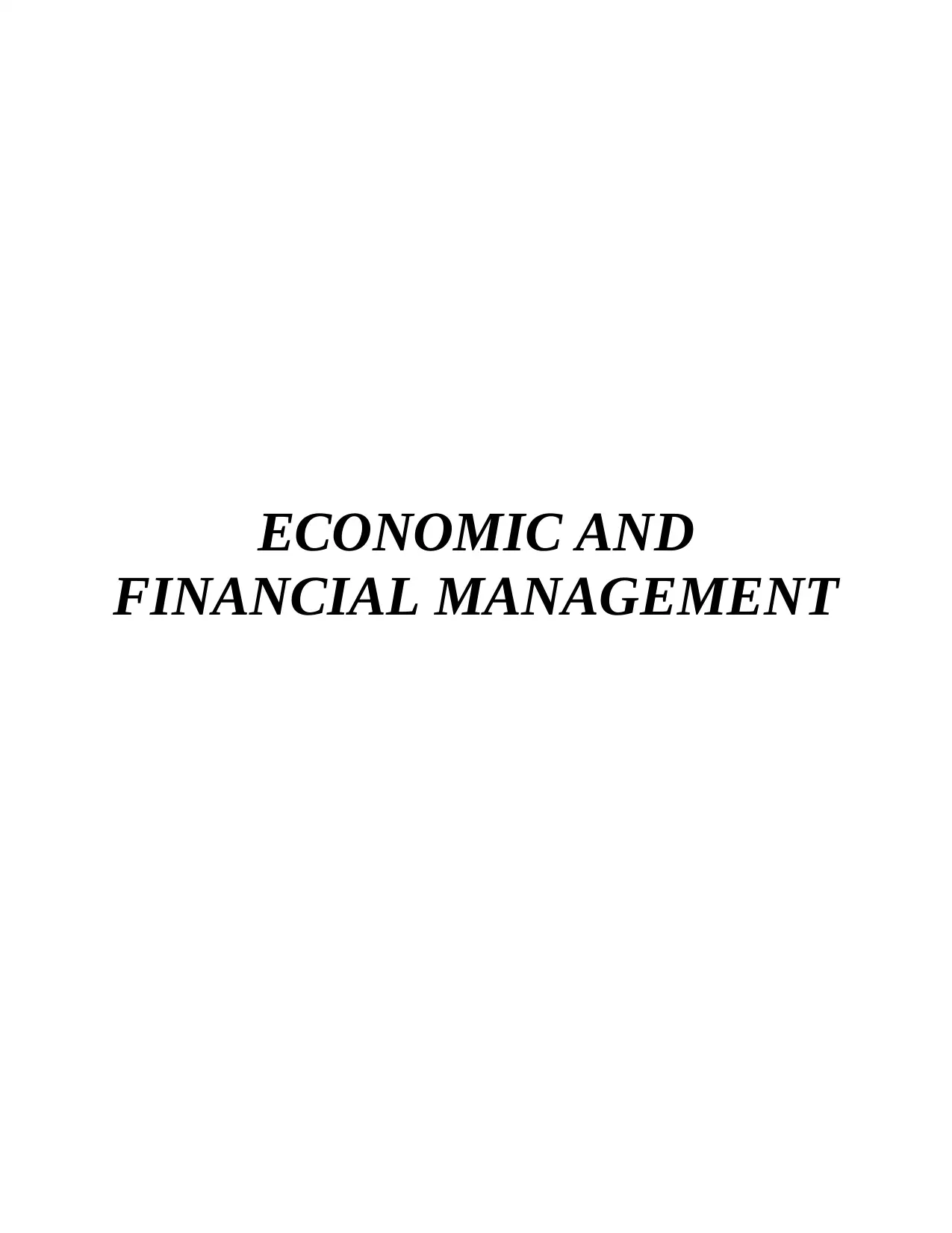
ECONOMIC AND
FINANCIAL MANAGEMENT
FINANCIAL MANAGEMENT
Paraphrase This Document
Need a fresh take? Get an instant paraphrase of this document with our AI Paraphraser
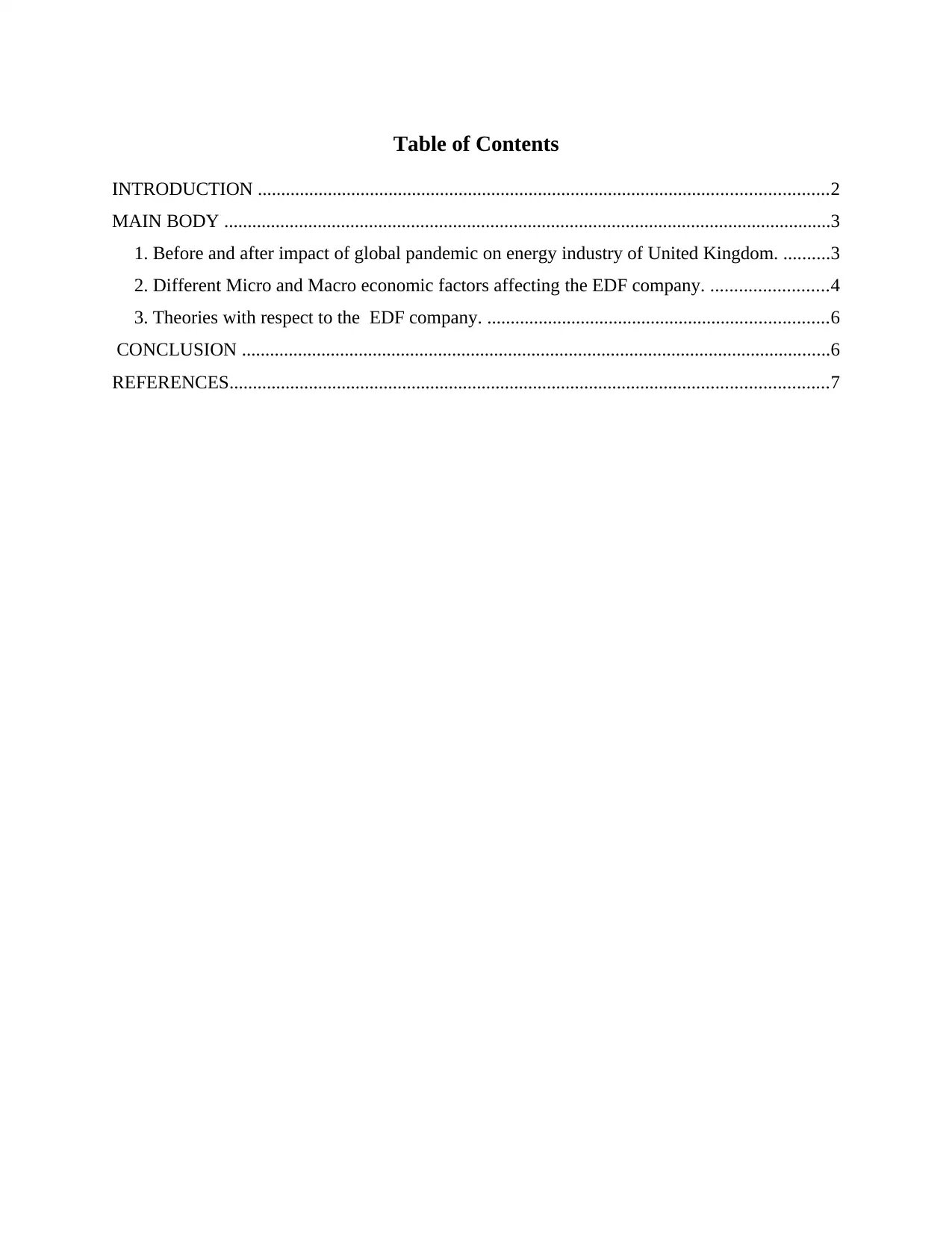
Table of Contents
INTRODUCTION ..........................................................................................................................2
MAIN BODY ..................................................................................................................................3
1. Before and after impact of global pandemic on energy industry of United Kingdom. ..........3
2. Different Micro and Macro economic factors affecting the EDF company. .........................4
3. Theories with respect to the EDF company. .........................................................................6
CONCLUSION ..............................................................................................................................6
REFERENCES................................................................................................................................7
INTRODUCTION ..........................................................................................................................2
MAIN BODY ..................................................................................................................................3
1. Before and after impact of global pandemic on energy industry of United Kingdom. ..........3
2. Different Micro and Macro economic factors affecting the EDF company. .........................4
3. Theories with respect to the EDF company. .........................................................................6
CONCLUSION ..............................................................................................................................6
REFERENCES................................................................................................................................7
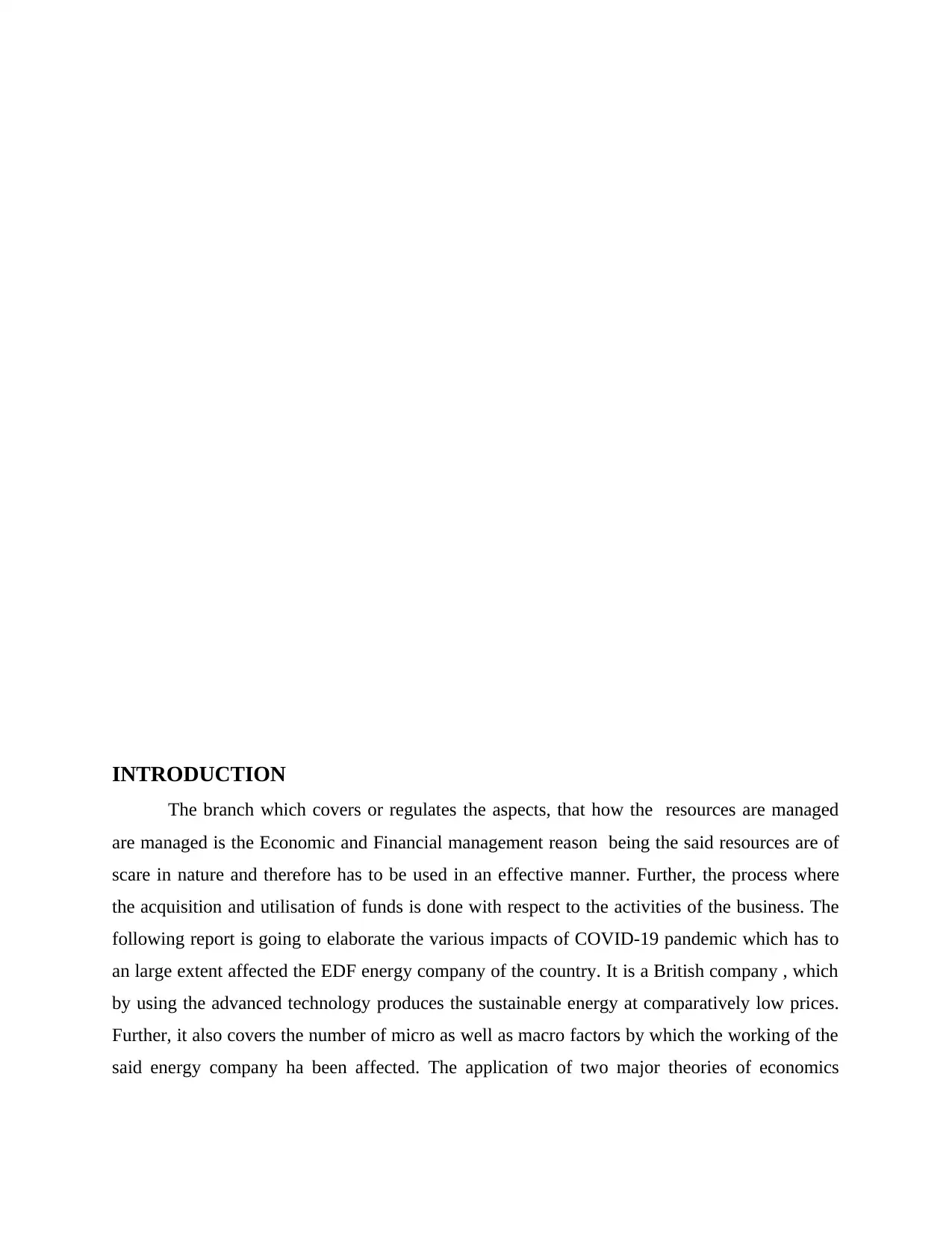
INTRODUCTION
The branch which covers or regulates the aspects, that how the resources are managed
are managed is the Economic and Financial management reason being the said resources are of
scare in nature and therefore has to be used in an effective manner. Further, the process where
the acquisition and utilisation of funds is done with respect to the activities of the business. The
following report is going to elaborate the various impacts of COVID-19 pandemic which has to
an large extent affected the EDF energy company of the country. It is a British company , which
by using the advanced technology produces the sustainable energy at comparatively low prices.
Further, it also covers the number of micro as well as macro factors by which the working of the
said energy company ha been affected. The application of two major theories of economics
The branch which covers or regulates the aspects, that how the resources are managed
are managed is the Economic and Financial management reason being the said resources are of
scare in nature and therefore has to be used in an effective manner. Further, the process where
the acquisition and utilisation of funds is done with respect to the activities of the business. The
following report is going to elaborate the various impacts of COVID-19 pandemic which has to
an large extent affected the EDF energy company of the country. It is a British company , which
by using the advanced technology produces the sustainable energy at comparatively low prices.
Further, it also covers the number of micro as well as macro factors by which the working of the
said energy company ha been affected. The application of two major theories of economics
⊘ This is a preview!⊘
Do you want full access?
Subscribe today to unlock all pages.

Trusted by 1+ million students worldwide
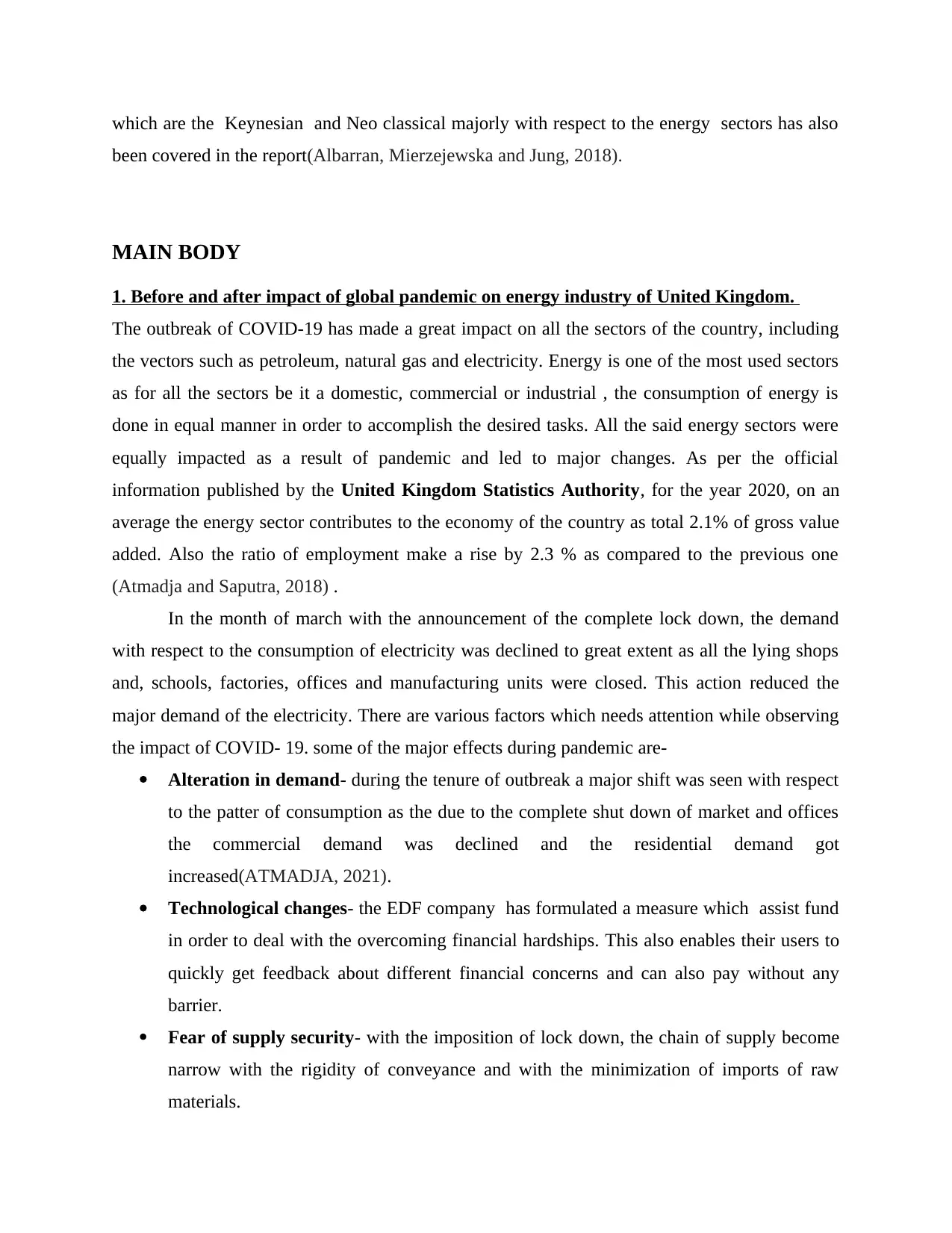
which are the Keynesian and Neo classical majorly with respect to the energy sectors has also
been covered in the report(Albarran, Mierzejewska and Jung, 2018).
MAIN BODY
1. Before and after impact of global pandemic on energy industry of United Kingdom.
The outbreak of COVID-19 has made a great impact on all the sectors of the country, including
the vectors such as petroleum, natural gas and electricity. Energy is one of the most used sectors
as for all the sectors be it a domestic, commercial or industrial , the consumption of energy is
done in equal manner in order to accomplish the desired tasks. All the said energy sectors were
equally impacted as a result of pandemic and led to major changes. As per the official
information published by the United Kingdom Statistics Authority, for the year 2020, on an
average the energy sector contributes to the economy of the country as total 2.1% of gross value
added. Also the ratio of employment make a rise by 2.3 % as compared to the previous one
(Atmadja and Saputra, 2018) .
In the month of march with the announcement of the complete lock down, the demand
with respect to the consumption of electricity was declined to great extent as all the lying shops
and, schools, factories, offices and manufacturing units were closed. This action reduced the
major demand of the electricity. There are various factors which needs attention while observing
the impact of COVID- 19. some of the major effects during pandemic are-
Alteration in demand- during the tenure of outbreak a major shift was seen with respect
to the patter of consumption as the due to the complete shut down of market and offices
the commercial demand was declined and the residential demand got
increased(ATMADJA, 2021).
Technological changes- the EDF company has formulated a measure which assist fund
in order to deal with the overcoming financial hardships. This also enables their users to
quickly get feedback about different financial concerns and can also pay without any
barrier.
Fear of supply security- with the imposition of lock down, the chain of supply become
narrow with the rigidity of conveyance and with the minimization of imports of raw
materials.
been covered in the report(Albarran, Mierzejewska and Jung, 2018).
MAIN BODY
1. Before and after impact of global pandemic on energy industry of United Kingdom.
The outbreak of COVID-19 has made a great impact on all the sectors of the country, including
the vectors such as petroleum, natural gas and electricity. Energy is one of the most used sectors
as for all the sectors be it a domestic, commercial or industrial , the consumption of energy is
done in equal manner in order to accomplish the desired tasks. All the said energy sectors were
equally impacted as a result of pandemic and led to major changes. As per the official
information published by the United Kingdom Statistics Authority, for the year 2020, on an
average the energy sector contributes to the economy of the country as total 2.1% of gross value
added. Also the ratio of employment make a rise by 2.3 % as compared to the previous one
(Atmadja and Saputra, 2018) .
In the month of march with the announcement of the complete lock down, the demand
with respect to the consumption of electricity was declined to great extent as all the lying shops
and, schools, factories, offices and manufacturing units were closed. This action reduced the
major demand of the electricity. There are various factors which needs attention while observing
the impact of COVID- 19. some of the major effects during pandemic are-
Alteration in demand- during the tenure of outbreak a major shift was seen with respect
to the patter of consumption as the due to the complete shut down of market and offices
the commercial demand was declined and the residential demand got
increased(ATMADJA, 2021).
Technological changes- the EDF company has formulated a measure which assist fund
in order to deal with the overcoming financial hardships. This also enables their users to
quickly get feedback about different financial concerns and can also pay without any
barrier.
Fear of supply security- with the imposition of lock down, the chain of supply become
narrow with the rigidity of conveyance and with the minimization of imports of raw
materials.
Paraphrase This Document
Need a fresh take? Get an instant paraphrase of this document with our AI Paraphraser
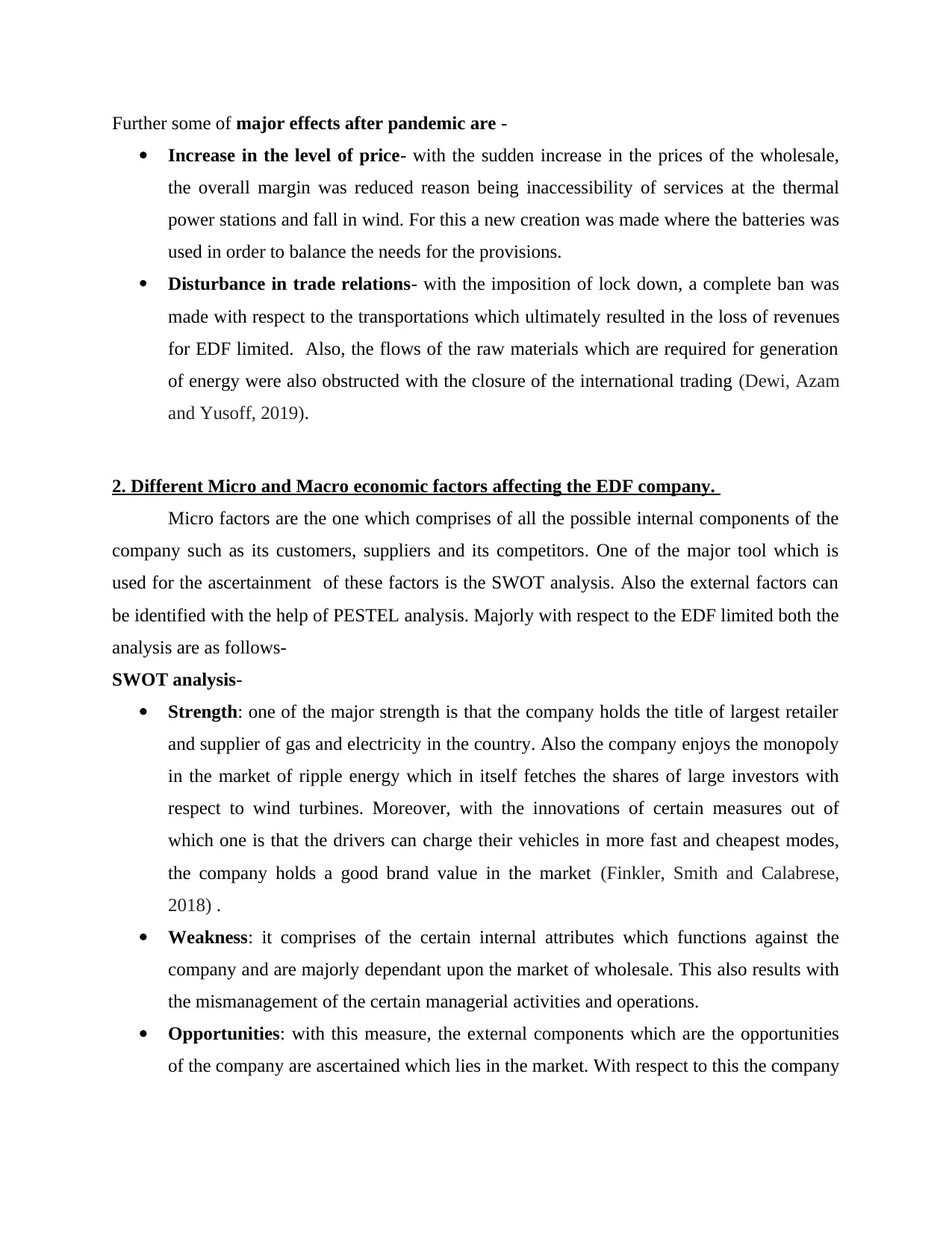
Further some of major effects after pandemic are -
Increase in the level of price- with the sudden increase in the prices of the wholesale,
the overall margin was reduced reason being inaccessibility of services at the thermal
power stations and fall in wind. For this a new creation was made where the batteries was
used in order to balance the needs for the provisions.
Disturbance in trade relations- with the imposition of lock down, a complete ban was
made with respect to the transportations which ultimately resulted in the loss of revenues
for EDF limited. Also, the flows of the raw materials which are required for generation
of energy were also obstructed with the closure of the international trading (Dewi, Azam
and Yusoff, 2019).
2. Different Micro and Macro economic factors affecting the EDF company.
Micro factors are the one which comprises of all the possible internal components of the
company such as its customers, suppliers and its competitors. One of the major tool which is
used for the ascertainment of these factors is the SWOT analysis. Also the external factors can
be identified with the help of PESTEL analysis. Majorly with respect to the EDF limited both the
analysis are as follows-
SWOT analysis-
Strength: one of the major strength is that the company holds the title of largest retailer
and supplier of gas and electricity in the country. Also the company enjoys the monopoly
in the market of ripple energy which in itself fetches the shares of large investors with
respect to wind turbines. Moreover, with the innovations of certain measures out of
which one is that the drivers can charge their vehicles in more fast and cheapest modes,
the company holds a good brand value in the market (Finkler, Smith and Calabrese,
2018) .
Weakness: it comprises of the certain internal attributes which functions against the
company and are majorly dependant upon the market of wholesale. This also results with
the mismanagement of the certain managerial activities and operations.
Opportunities: with this measure, the external components which are the opportunities
of the company are ascertained which lies in the market. With respect to this the company
Increase in the level of price- with the sudden increase in the prices of the wholesale,
the overall margin was reduced reason being inaccessibility of services at the thermal
power stations and fall in wind. For this a new creation was made where the batteries was
used in order to balance the needs for the provisions.
Disturbance in trade relations- with the imposition of lock down, a complete ban was
made with respect to the transportations which ultimately resulted in the loss of revenues
for EDF limited. Also, the flows of the raw materials which are required for generation
of energy were also obstructed with the closure of the international trading (Dewi, Azam
and Yusoff, 2019).
2. Different Micro and Macro economic factors affecting the EDF company.
Micro factors are the one which comprises of all the possible internal components of the
company such as its customers, suppliers and its competitors. One of the major tool which is
used for the ascertainment of these factors is the SWOT analysis. Also the external factors can
be identified with the help of PESTEL analysis. Majorly with respect to the EDF limited both the
analysis are as follows-
SWOT analysis-
Strength: one of the major strength is that the company holds the title of largest retailer
and supplier of gas and electricity in the country. Also the company enjoys the monopoly
in the market of ripple energy which in itself fetches the shares of large investors with
respect to wind turbines. Moreover, with the innovations of certain measures out of
which one is that the drivers can charge their vehicles in more fast and cheapest modes,
the company holds a good brand value in the market (Finkler, Smith and Calabrese,
2018) .
Weakness: it comprises of the certain internal attributes which functions against the
company and are majorly dependant upon the market of wholesale. This also results with
the mismanagement of the certain managerial activities and operations.
Opportunities: with this measure, the external components which are the opportunities
of the company are ascertained which lies in the market. With respect to this the company
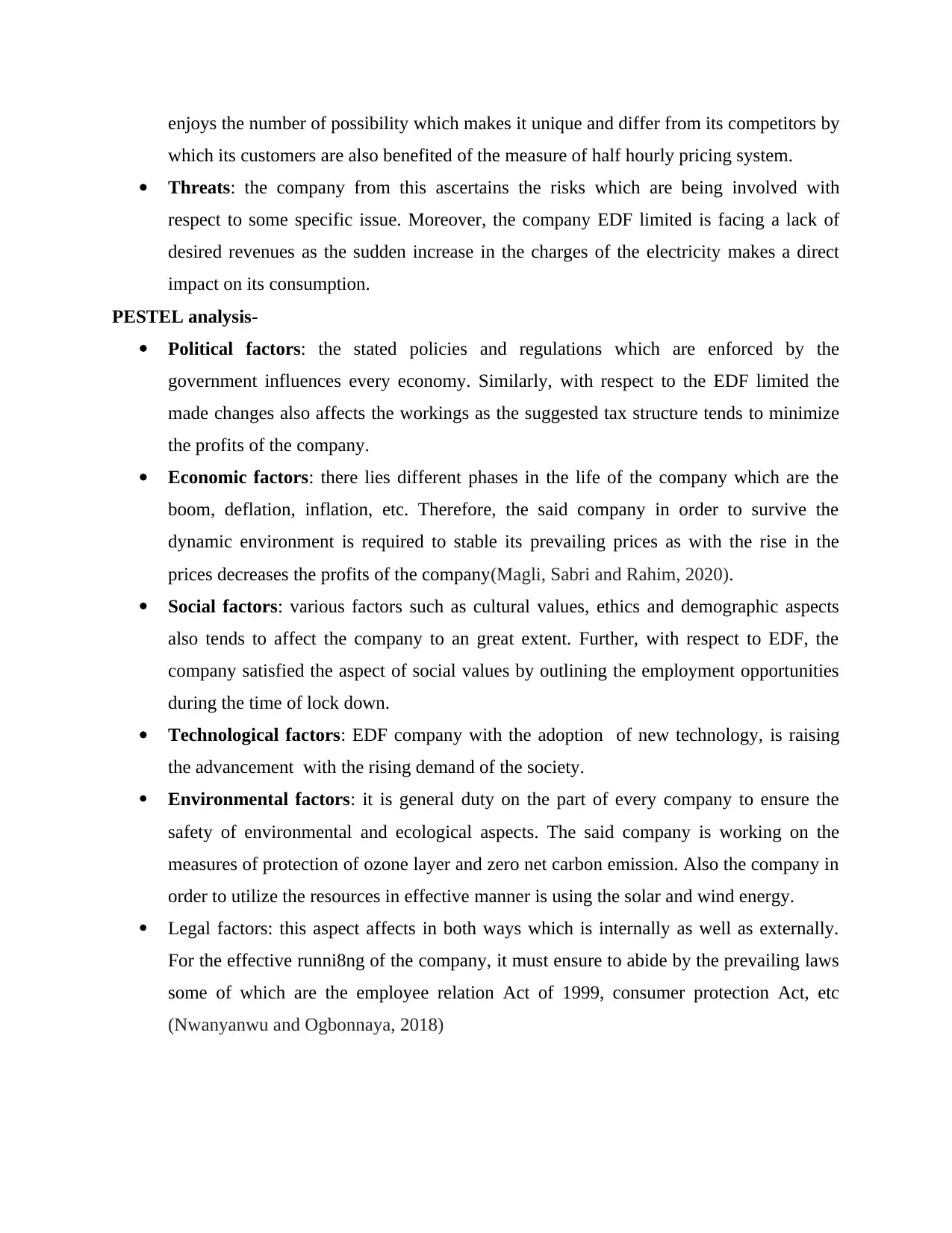
enjoys the number of possibility which makes it unique and differ from its competitors by
which its customers are also benefited of the measure of half hourly pricing system.
Threats: the company from this ascertains the risks which are being involved with
respect to some specific issue. Moreover, the company EDF limited is facing a lack of
desired revenues as the sudden increase in the charges of the electricity makes a direct
impact on its consumption.
PESTEL analysis-
Political factors: the stated policies and regulations which are enforced by the
government influences every economy. Similarly, with respect to the EDF limited the
made changes also affects the workings as the suggested tax structure tends to minimize
the profits of the company.
Economic factors: there lies different phases in the life of the company which are the
boom, deflation, inflation, etc. Therefore, the said company in order to survive the
dynamic environment is required to stable its prevailing prices as with the rise in the
prices decreases the profits of the company(Magli, Sabri and Rahim, 2020).
Social factors: various factors such as cultural values, ethics and demographic aspects
also tends to affect the company to an great extent. Further, with respect to EDF, the
company satisfied the aspect of social values by outlining the employment opportunities
during the time of lock down.
Technological factors: EDF company with the adoption of new technology, is raising
the advancement with the rising demand of the society.
Environmental factors: it is general duty on the part of every company to ensure the
safety of environmental and ecological aspects. The said company is working on the
measures of protection of ozone layer and zero net carbon emission. Also the company in
order to utilize the resources in effective manner is using the solar and wind energy.
Legal factors: this aspect affects in both ways which is internally as well as externally.
For the effective runni8ng of the company, it must ensure to abide by the prevailing laws
some of which are the employee relation Act of 1999, consumer protection Act, etc
(Nwanyanwu and Ogbonnaya, 2018)
which its customers are also benefited of the measure of half hourly pricing system.
Threats: the company from this ascertains the risks which are being involved with
respect to some specific issue. Moreover, the company EDF limited is facing a lack of
desired revenues as the sudden increase in the charges of the electricity makes a direct
impact on its consumption.
PESTEL analysis-
Political factors: the stated policies and regulations which are enforced by the
government influences every economy. Similarly, with respect to the EDF limited the
made changes also affects the workings as the suggested tax structure tends to minimize
the profits of the company.
Economic factors: there lies different phases in the life of the company which are the
boom, deflation, inflation, etc. Therefore, the said company in order to survive the
dynamic environment is required to stable its prevailing prices as with the rise in the
prices decreases the profits of the company(Magli, Sabri and Rahim, 2020).
Social factors: various factors such as cultural values, ethics and demographic aspects
also tends to affect the company to an great extent. Further, with respect to EDF, the
company satisfied the aspect of social values by outlining the employment opportunities
during the time of lock down.
Technological factors: EDF company with the adoption of new technology, is raising
the advancement with the rising demand of the society.
Environmental factors: it is general duty on the part of every company to ensure the
safety of environmental and ecological aspects. The said company is working on the
measures of protection of ozone layer and zero net carbon emission. Also the company in
order to utilize the resources in effective manner is using the solar and wind energy.
Legal factors: this aspect affects in both ways which is internally as well as externally.
For the effective runni8ng of the company, it must ensure to abide by the prevailing laws
some of which are the employee relation Act of 1999, consumer protection Act, etc
(Nwanyanwu and Ogbonnaya, 2018)
⊘ This is a preview!⊘
Do you want full access?
Subscribe today to unlock all pages.

Trusted by 1+ million students worldwide
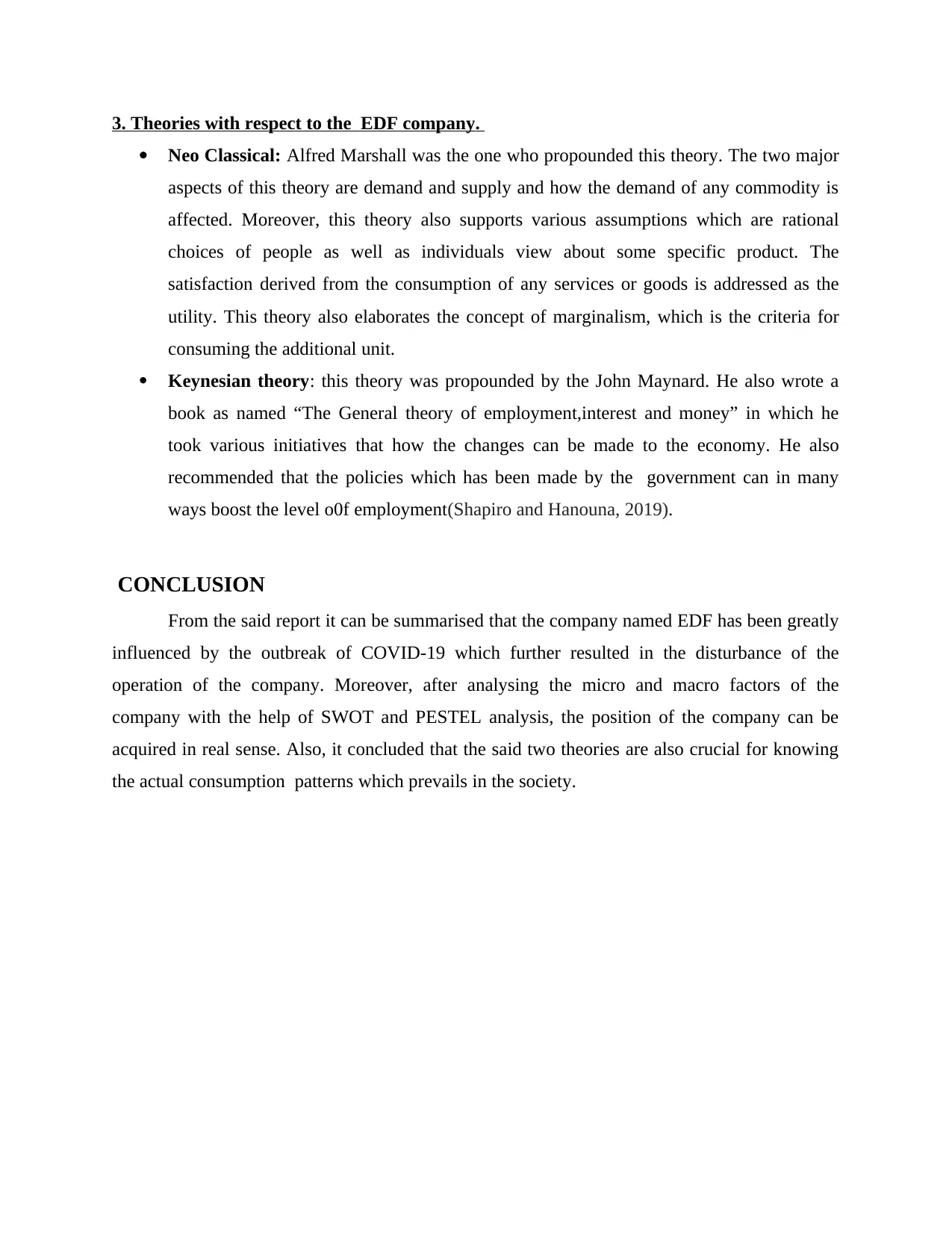
3. Theories with respect to the EDF company.
Neo Classical: Alfred Marshall was the one who propounded this theory. The two major
aspects of this theory are demand and supply and how the demand of any commodity is
affected. Moreover, this theory also supports various assumptions which are rational
choices of people as well as individuals view about some specific product. The
satisfaction derived from the consumption of any services or goods is addressed as the
utility. This theory also elaborates the concept of marginalism, which is the criteria for
consuming the additional unit.
Keynesian theory: this theory was propounded by the John Maynard. He also wrote a
book as named “The General theory of employment,interest and money” in which he
took various initiatives that how the changes can be made to the economy. He also
recommended that the policies which has been made by the government can in many
ways boost the level o0f employment(Shapiro and Hanouna, 2019).
CONCLUSION
From the said report it can be summarised that the company named EDF has been greatly
influenced by the outbreak of COVID-19 which further resulted in the disturbance of the
operation of the company. Moreover, after analysing the micro and macro factors of the
company with the help of SWOT and PESTEL analysis, the position of the company can be
acquired in real sense. Also, it concluded that the said two theories are also crucial for knowing
the actual consumption patterns which prevails in the society.
Neo Classical: Alfred Marshall was the one who propounded this theory. The two major
aspects of this theory are demand and supply and how the demand of any commodity is
affected. Moreover, this theory also supports various assumptions which are rational
choices of people as well as individuals view about some specific product. The
satisfaction derived from the consumption of any services or goods is addressed as the
utility. This theory also elaborates the concept of marginalism, which is the criteria for
consuming the additional unit.
Keynesian theory: this theory was propounded by the John Maynard. He also wrote a
book as named “The General theory of employment,interest and money” in which he
took various initiatives that how the changes can be made to the economy. He also
recommended that the policies which has been made by the government can in many
ways boost the level o0f employment(Shapiro and Hanouna, 2019).
CONCLUSION
From the said report it can be summarised that the company named EDF has been greatly
influenced by the outbreak of COVID-19 which further resulted in the disturbance of the
operation of the company. Moreover, after analysing the micro and macro factors of the
company with the help of SWOT and PESTEL analysis, the position of the company can be
acquired in real sense. Also, it concluded that the said two theories are also crucial for knowing
the actual consumption patterns which prevails in the society.
Paraphrase This Document
Need a fresh take? Get an instant paraphrase of this document with our AI Paraphraser
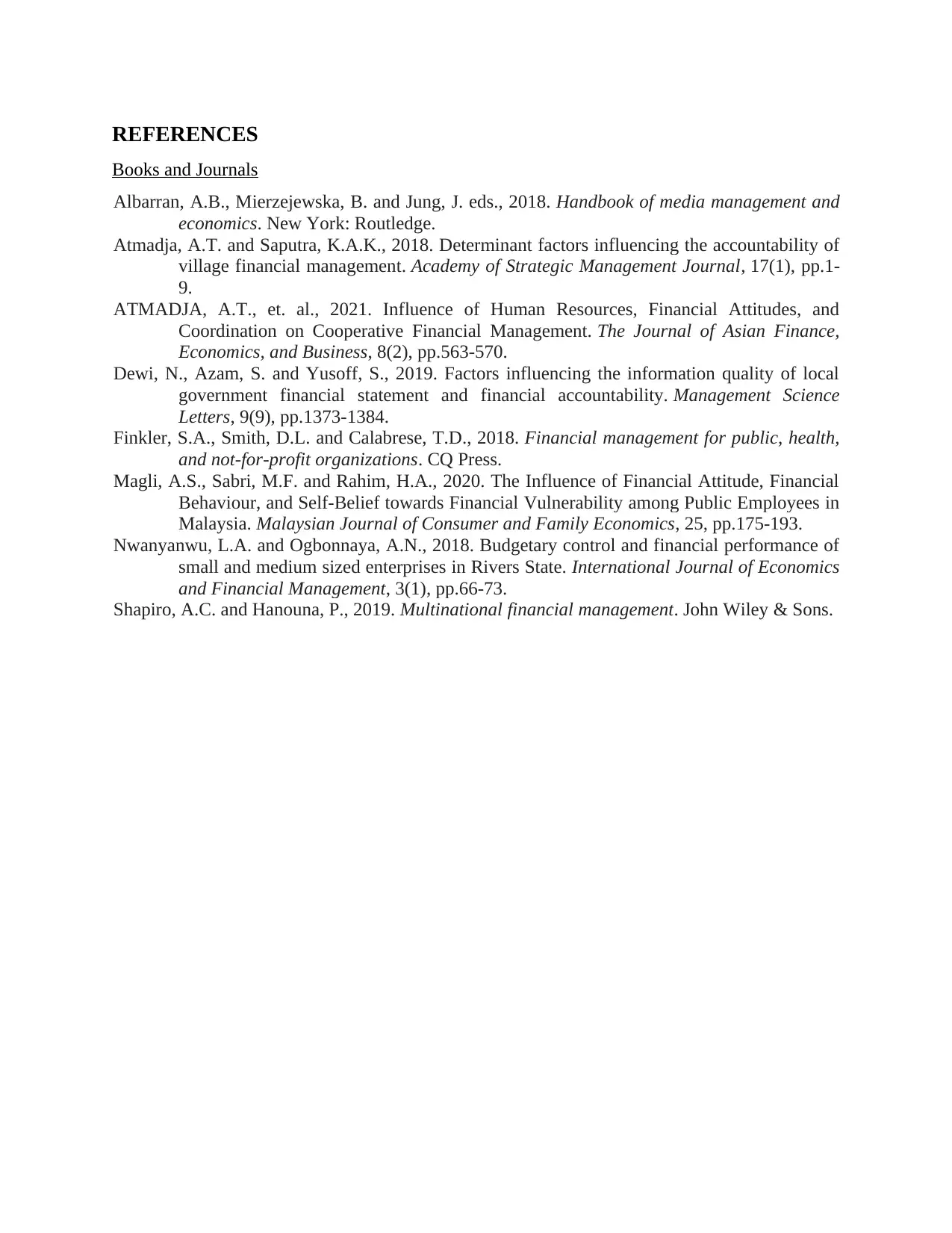
REFERENCES
Books and Journals
Albarran, A.B., Mierzejewska, B. and Jung, J. eds., 2018. Handbook of media management and
economics. New York: Routledge.
Atmadja, A.T. and Saputra, K.A.K., 2018. Determinant factors influencing the accountability of
village financial management. Academy of Strategic Management Journal, 17(1), pp.1-
9.
ATMADJA, A.T., et. al., 2021. Influence of Human Resources, Financial Attitudes, and
Coordination on Cooperative Financial Management. The Journal of Asian Finance,
Economics, and Business, 8(2), pp.563-570.
Dewi, N., Azam, S. and Yusoff, S., 2019. Factors influencing the information quality of local
government financial statement and financial accountability. Management Science
Letters, 9(9), pp.1373-1384.
Finkler, S.A., Smith, D.L. and Calabrese, T.D., 2018. Financial management for public, health,
and not-for-profit organizations. CQ Press.
Magli, A.S., Sabri, M.F. and Rahim, H.A., 2020. The Influence of Financial Attitude, Financial
Behaviour, and Self-Belief towards Financial Vulnerability among Public Employees in
Malaysia. Malaysian Journal of Consumer and Family Economics, 25, pp.175-193.
Nwanyanwu, L.A. and Ogbonnaya, A.N., 2018. Budgetary control and financial performance of
small and medium sized enterprises in Rivers State. International Journal of Economics
and Financial Management, 3(1), pp.66-73.
Shapiro, A.C. and Hanouna, P., 2019. Multinational financial management. John Wiley & Sons.
Books and Journals
Albarran, A.B., Mierzejewska, B. and Jung, J. eds., 2018. Handbook of media management and
economics. New York: Routledge.
Atmadja, A.T. and Saputra, K.A.K., 2018. Determinant factors influencing the accountability of
village financial management. Academy of Strategic Management Journal, 17(1), pp.1-
9.
ATMADJA, A.T., et. al., 2021. Influence of Human Resources, Financial Attitudes, and
Coordination on Cooperative Financial Management. The Journal of Asian Finance,
Economics, and Business, 8(2), pp.563-570.
Dewi, N., Azam, S. and Yusoff, S., 2019. Factors influencing the information quality of local
government financial statement and financial accountability. Management Science
Letters, 9(9), pp.1373-1384.
Finkler, S.A., Smith, D.L. and Calabrese, T.D., 2018. Financial management for public, health,
and not-for-profit organizations. CQ Press.
Magli, A.S., Sabri, M.F. and Rahim, H.A., 2020. The Influence of Financial Attitude, Financial
Behaviour, and Self-Belief towards Financial Vulnerability among Public Employees in
Malaysia. Malaysian Journal of Consumer and Family Economics, 25, pp.175-193.
Nwanyanwu, L.A. and Ogbonnaya, A.N., 2018. Budgetary control and financial performance of
small and medium sized enterprises in Rivers State. International Journal of Economics
and Financial Management, 3(1), pp.66-73.
Shapiro, A.C. and Hanouna, P., 2019. Multinational financial management. John Wiley & Sons.
1 out of 8
Related Documents
Your All-in-One AI-Powered Toolkit for Academic Success.
+13062052269
info@desklib.com
Available 24*7 on WhatsApp / Email
![[object Object]](/_next/static/media/star-bottom.7253800d.svg)
Unlock your academic potential
Copyright © 2020–2026 A2Z Services. All Rights Reserved. Developed and managed by ZUCOL.





